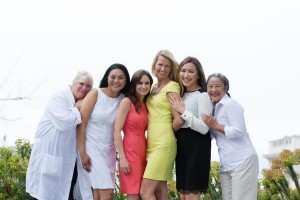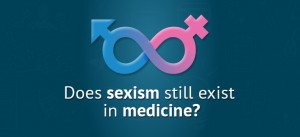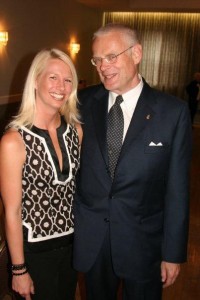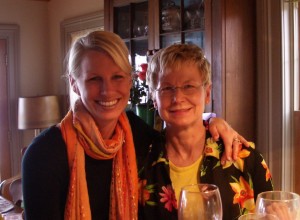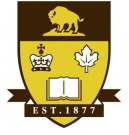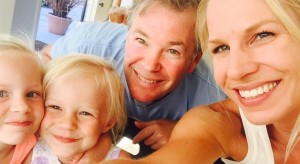From a woman Plastic Surgeon – is there sexism in surgery?
I am very active on social media, particularly Twitter, as it enables me to reach a broad audience in educating the public and fellow colleagues about what I do and my opinions on breast reconstruction, Botox, beauty, being a Mom of twins myself, Mommy Makeovers and all things Plastic Surgery!
I was asked to comment on a blog post entitled “Does sexism still exist in medicine?” via my Twitter feed. This is not a topic I normally think about, so I spent some time thinking about this question before reading the article.
After reading it and thinking about women in Medicine and Surgery, I was inspired to reflect on my personal experience as a woman Plastic Surgeon.
The Twitter article I was asked to review quoted a Nobel laureate’s comments on Women in Science, where at the World Conference of Science Journalists in Seoul, South Korea, he blatantly commented that he himself preferred to work in “single-sex laboratories.”
In his words: “Let me tell you about my trouble with girls. Three things happen when they are in the lab: you fall in love with them, they fall in love with you, and when you criticize them they cry..”
That just sounded ludicrous to me! However, my journey to becoming a Plastic Surgeon as a woman has been mostly positive but I have experienced a few challenges along the way. In response to being asked whether I believed that sexism exists in medicine?, I thought I would share my reflections about my training and career via a blog post.
The article I read listed several potential reasons why sexism occurs in Medicine and suggests why women might not be more empowered, even at present times. These include:
- Lack of leadership
- Inadequate mentorship
- Hesitance or uncomfortable feelings when talking to superiors
- Difficulty meeting criteria for promotion
- Fear of “backlash” for complaints
- Unclear policies
Who were MY leaders? Probably, my parents! I came to be a surgeon honestly. My father was a breast cancer specialist at the University of Toronto for around 30 years. I am the oldest of three girls, and growing up, although I didn’t see him much and he didn’t share his day-to-day experiences with his daughters, I knew how important my Dad’s job was and that he HELPED people.
Although I fought the urge to follow immediately in his footsteps, I did follow my interests and passion in school, including math, science and art, and despite envisioning a career working with children as a Pediatrician, I found my way to Plastic Surgery!
To learn about the history of Plastic Surgery, why on earth it is called “plastic” when it usually involves rearranging the body’s living tissue, and Plastic Surgery’s various applications to helping people of all ages, all body parts, for innumerable cosmetic and reconstructive purposes read my blog posts that dispel myths about Plastic Surgery.
Who were my Mentors? Although my mother was not a Physician herself, she was Ph.D. scientist before I was born, and she was my hero and main inspiration growing up! My Mom also was a huge influence and inspiration to me as a young woman and future professional. Read a blog post which gives thanks to my Mom here.
Tiiu instilled in me the message that “you can be anything you want to be in life, except for a Daddy”. And that is what I believed growing up! Thanks to my Mom for not swaying me in any particular career direction except for that which I was interested in! And that evolved into medicine and surgery.
During my 10 years of medical training, I was fortunate enough to have supportive and encouraging Mentors, all of whom happened to be men. Unfortunately, no women Doctors or Plastic Surgeons were available to me during my training as Mentors. But that’s okay; I had great Mentors who inspired and encouraged me, without any evidence of sexism.
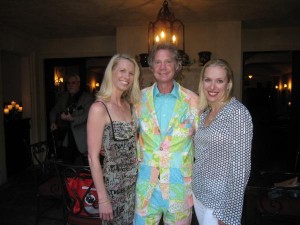
Dr. Karen Horton with fellow GABRs Reconstructive Microsurgeons Dr. Bob Allen and Dr. Aldona Spiegel, all DIEP flap breast reconstruction experts
The inspiration to apply to Medical School was my father’s colleague, Dr. Paul Walker, a Vascular Surgeon who seemed to have it all – a busy, exciting surgical career, active basic science research lab where I worked for a summer, a busy social life with time to play squash and take his wife out for dinner… He was an active father and an outgoing, positive person I could relate to.
I looked up to and wanted to emulate this Mentor, but I inherently understood he also had a strong network of supporters who made it all happen – his spouse, office manager, research director, Residents and Fellows who did most of the ‘grunt work’, supportive colleagues, friends, and children who understood and supported him. No one can do it all without important supporters!
Although my career doesn’t encompass all of those things, I have the components that matter and that ENABLE me to practice medicine selflessly with my patients’ best interests in mind at all times. I love what I do and I am so fortunate to have made a career of doing what I love!
The individual who is responsible for me becoming a Plastic Surgeon is Dr. Chris Forrest, a Craniofacial Surgeon who I worked with for two summers doing clinical research during Medical School at the University of Toronto. Through Dr. Forrest, I learned about all the various aspects of Plastic Surgery and the wonders of helping others using my artistic skill, interest and passion for body image and self-esteem, and the finesse of fine tissue-handling techniques that come with Reconstructive Microsurgery.
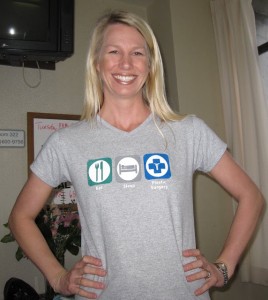
Dr. Karen Horton during her year of Fellowship training in Reconstructive Microsurgery: “Eat – Sleep – Plastic Surgery”!
I was treated like a motivated, eager surgical candidate rather than ‘FEMALE’, and my gender never came up in my interactions with the great majority of Faculty during Medical School. I realize not all women have that experience, and I feel fortunate for that.
Other leaders I was inspired, influenced and educated by during my training are my teachers Dr. Ken Murray and Dr. Tom Hayakawa at the University of Manitoba, and my Fellowship Mentor and current Microsurgical partner, Dr. Rudy Buntic. Although my Mentors were all men, I usually have felt I was treated like a student/Fellow/colleague/surgeon FIRST, rather than a woman.
However, I was intimidated by one colleague’s comments that if I became pregnant during my training in Plastic Surgery, I might not be allowed to sit for my Board exams. This individual’s goal was to scare me to avoid inconveniencing the Department of Plastic Surgery, and it worked. Although every married male Resident in surgery started their family during their training, the same did not occur for the women Residents. There was NO maternity/paternity leave for Residents in my training program, and I feared being kicked out of the program or not allowing to get Board Certified if I got pregnant during my Plastic Surgery training.
I got involved with student politics and PARIM, the Professional Association of Residents and Interns of Manitoba, and thanks to five years of increasing awareness and lobbying the university and government to put something in writing a protected parental leave, the result was that both female and male Residents were allowed to take 2 weeks off as personal leave without default if they had a child during their training when I graduated in 2005.
Fast-forward 10 years, and ALL Residents get protected parental leave to care for their babies if they have children during their training. My understanding is that most women surgical Residents indeed start their family during their training. I hear this leave can be up to a FULL YEAR, although the time needs to be made up later, without fear of losing their training spot. Women training in surgery are no longer intimidated about losing their position in their training program or not being allowed to take their Board Exams. PROGRESS!
I need to give the biggest shout-out to my primary supporter in life and professionally, my husband Mike Horton. He has supported me through my undergraduate training when we met and were dating, my Master’s degree (engaged), Medical School (newly married), the move to Winnipeg for five long, cold years of intense surgical training (little sleep and no time for anything other than work and studying), the move to San Francisco where he gave up his career a second time to support my training and my career, starting my private practice, and FINALLY, starting our family! We have been married now for 19 years and our twins are four and a half. And LIFE IS GOOD!
Mike has always put my training and career ahead of his own, as I had the drive, passion and love for my work that many professionals are not fortunate to experience. He is the ultimate NON-sexist supporter of me, and in turn all women in medicine in surgery. Without my husband’s support, I don’t think I would be as successful, professionally satisfied and guiltless in working 12-13 hour days Monday to Friday.
My daughters know that what their Mommy does is important, and they get that message from their Dad as well. I don’t get to see my kids that often during the week, but weekends are sacred family time and I am full-time Mom from Friday night to Monday morning…

I participate in online forums and in-person conferences educating women about their options for breast cancer reconstruction
My current practice focuses on treating women, although not exclusively so. A large proportion of my patients are breast cancer survivors, and as a woman Plastic Surgeon, many of them confide that they select me as their breast reconstructive surgeon specifically because I am a woman.
I am asked to be on Faculty as a speaker at scientific meetings in the United States and internationally, which is a huge honor, particularly being in a non-academic solo private practice! Many of my lectures focus on social media, and how you can use your professional website, Facebook, Twitter, LinkedIn and online review sites such as Yelp to spread your message about your practice vision and contribute to good educational information on the internet!
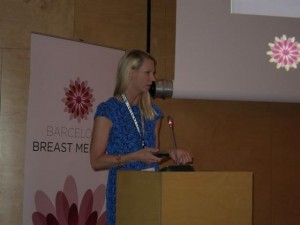
Dr. Horton is an invited guest lecturer at international symposiums such as the Barcelona Breast Meeting. Although she is one of few women speakers, she is treated just the same as the other Faculty!
Many of the colleagues I choose to work with and refer my patients too are also women. The two breast surgeons who do most of the mastectomies on my patients before reconstruction are both women. This is somewhat by chance, as I feel the best person for the job should be chosen, rather than one particular gender. These surgeons “get it” when it comes to saving the nipple whenever possible in cancer surgery and they appreciate the importance of the final aesthetic result in advanced breast reconstruction.
Although my practice is not academic, I enjoy teaching and mentoring Medical Students and Residents about Plastic Surgery. Many students who seek me out specifically as a mentor are women. My practice motto is “to educate, inform and empower” my patients, many of whom are women.
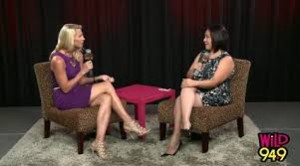 So, is there sexism in medicine and in surgery? I think you can find it if you look for it, and there will always be ‘victims’ in any profession, but most of my experiences in high school, 16 years of university training and over 9 years of private practice so far have been positive, without bias and with the empowerment I was given by my parents, my Mentors, my family and friends, and MYSELF!
So, is there sexism in medicine and in surgery? I think you can find it if you look for it, and there will always be ‘victims’ in any profession, but most of my experiences in high school, 16 years of university training and over 9 years of private practice so far have been positive, without bias and with the empowerment I was given by my parents, my Mentors, my family and friends, and MYSELF!
I choose to always view the glass half-full, and to see every experience as an opportunity to learn, both good and bad. Just like every surgery is “a learning case” (thanks, Dr. Murray!), the challenges I faced as a woman helped me to become the busy, successful, professionally fulfilled surgeon I am today. And I am just getting started!
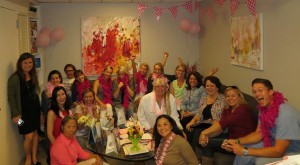
Dr. Horton has hosted the Bay Area’s only BRA (breast reconstruction awareness) Day event for the last 4 years, increasing the public’s awareness about options for women facing breast cancer
To learn more about Dr. Horton, visit her website or call 415-923-3067 today to schedule a consultation. Or complete our online consultation request form to be contacted by email.

